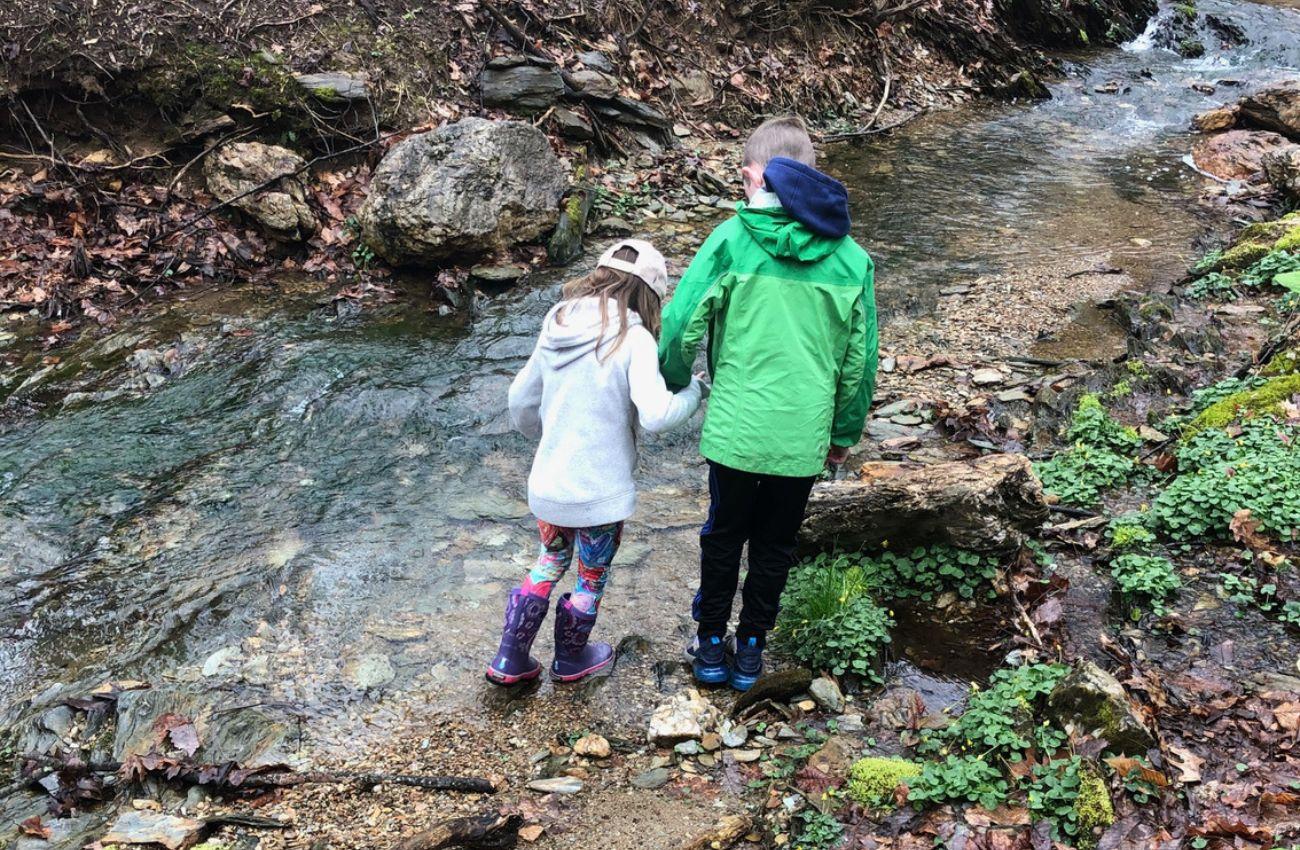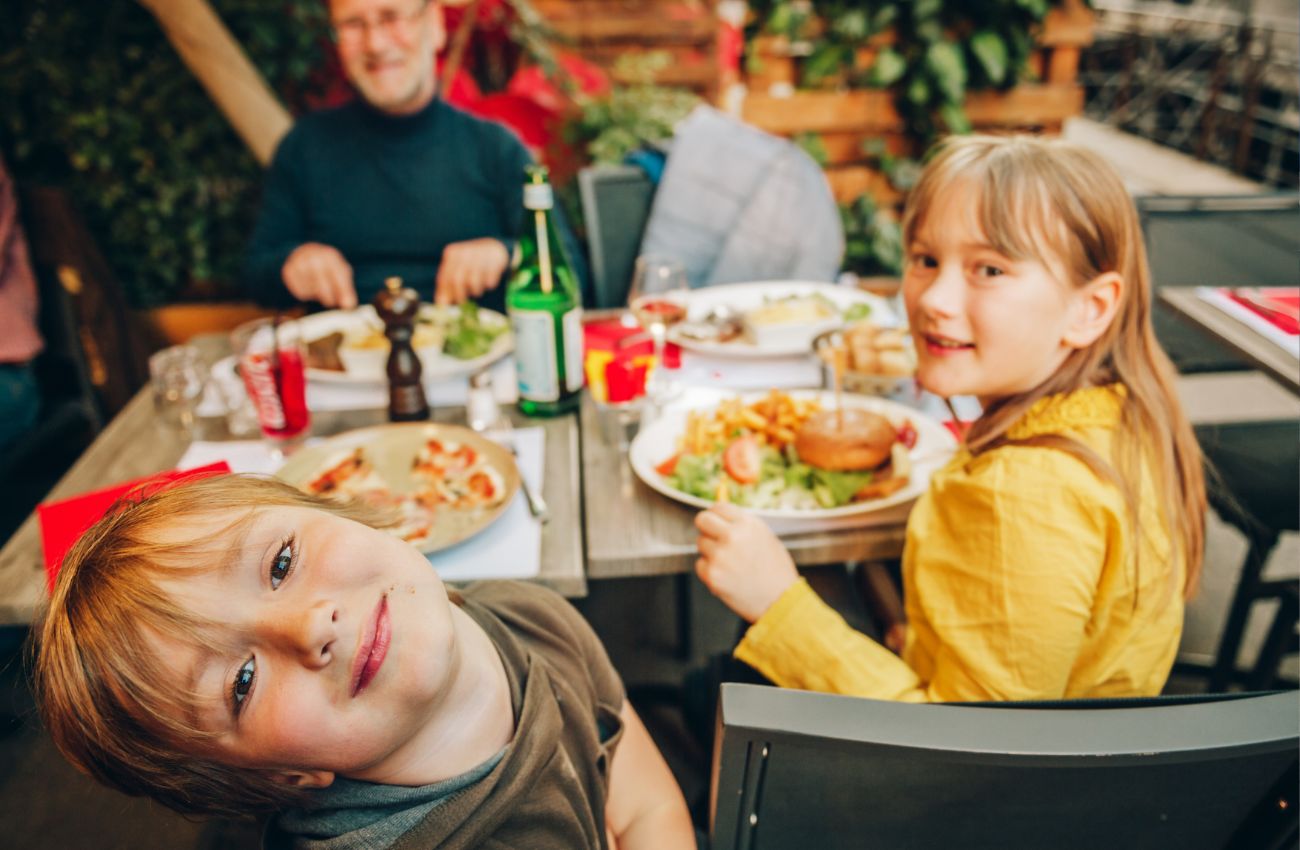Nurturing Curious Minds: The School in Rose Valley’s Unique Approach to Preschool and Elementary Education
A century of progressive education nestled in Delaware County's woodland campus builds skills that are more relevant than ever in 2025 and beyond.
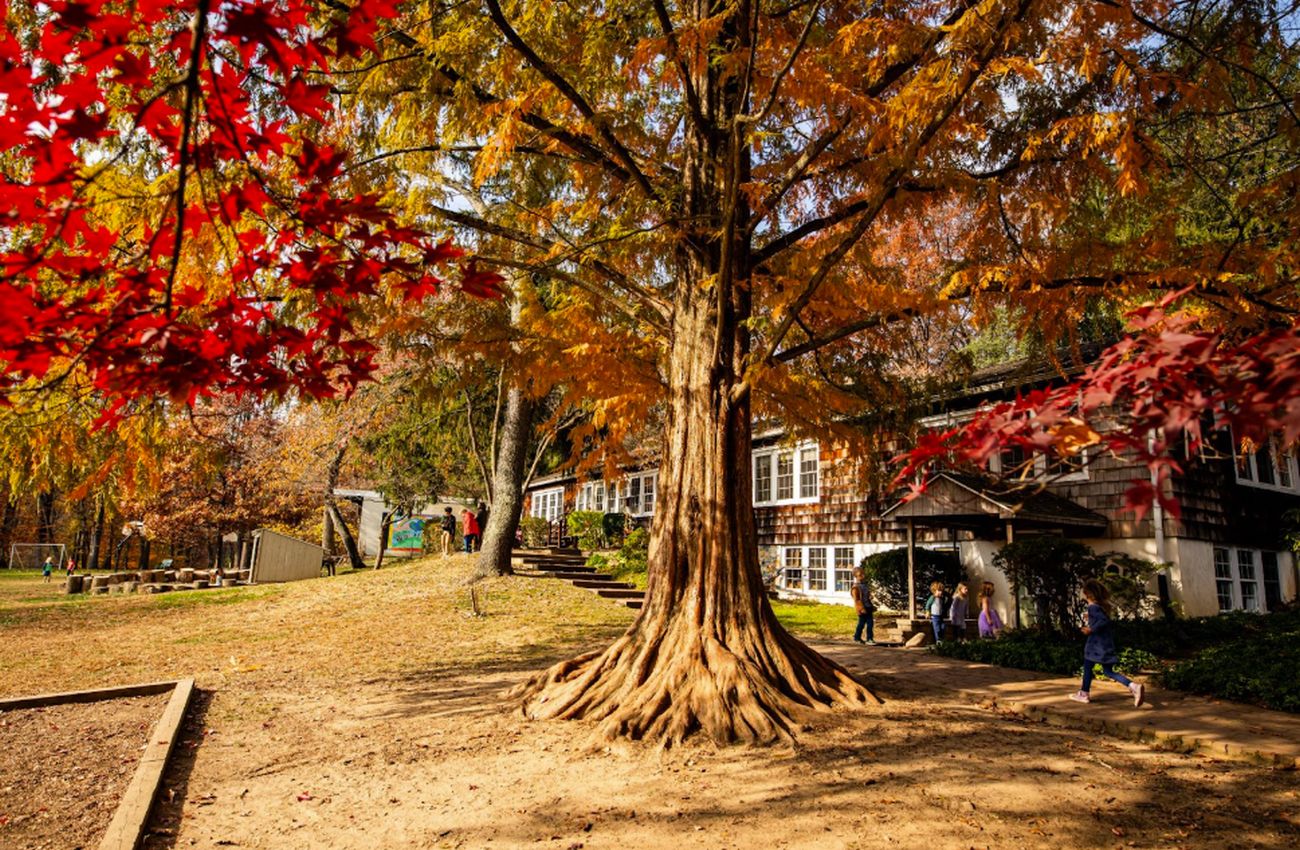
The School in Rose Valley (SRV) offers a refreshingly different approach to education from preschool through 6th grade, with a curriculum that builds seamlessly as children grow and develop. While this story highlights their exceptional preschool program—currently enrolling for Fall 2025—the school’s true strength lies in its continuous progressive philosophy that carries students through their entire elementary experience.
Discover this unique school nestled in the scenic woods of Rose Valley, which has been pioneering Main Line progressive education for nearly a century.
The School in Rose Valley’s Progressive Philosophy
While terms like “inquiry-based learning” and “project-based curriculum” have become educational buzzwords in recent years, at SRV, these concepts aren’t trendy additions—they’re foundational principles that have guided the school since its establishment in 1929.
“The school was founded during the Industrial Revolution when Carnegie and Rockefeller had shaped public education into more of a factory model—kids in desks learning the same thing at the same time for the same result,” explains Rory Mannion, Director of Enrollment Management. “The parents of Rose Valley, an arts and crafts community, partnered with a Swarthmore College professor to create something different—a school founded on progressive principles where children learn by doing.”
Nearly 100 years later, SRV continues to embrace this philosophy with their tagline “curiosity is our curriculum,” tapping into children’s natural abilities to question the world around them.
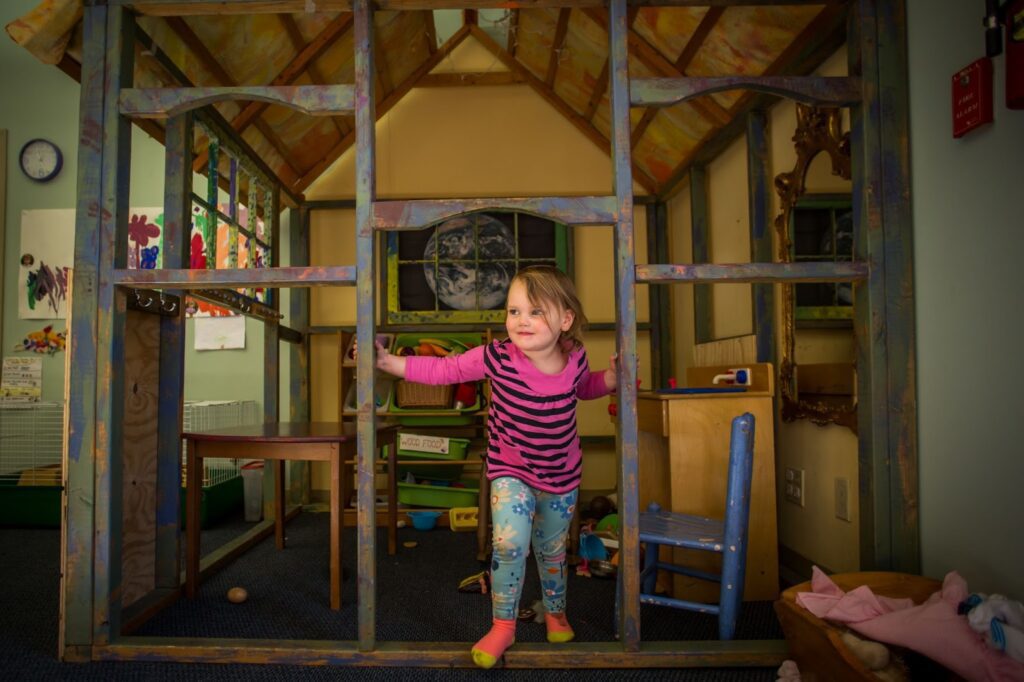
What Makes the Preschool Experience Unique
Child-Led Learning in Action
At SRV’s preschool program (which welcomes children as young as 2 years, 7 months), learning happens through play and exploration rather than teacher-directed lessons. Materials are open-ended, encouraging children to dictate their purpose.
“A car can only be a car, but a block could be a car, a phone, a tower, or a chair,” Mannion explains. “Recently, I walked into a classroom where children had arranged chairs into rows, creating a bus.”
“They were announcing stops, taking shifts as the driver, and discussing different types of transportation. This led to weeks of exploration about vehicles, from buses to airplanes to rocket ships,” Mannion said.
This organic approach to learning yields impressive results. In another classroom, when children began discussing being “three and a half” or “four and a half,” teachers seized the opportunity to explore fractions. What started as a casual conversation evolved into a weeks-long mathematical investigation with three and four-year-olds.
The Outdoor Classroom at SRV: 9½ Acres in Delaware County
SRV’s wooded campus serves as an extension of their classrooms, providing endless opportunities for discovery and growth.
“We don’t believe in bad weather, just bad clothes,” Mannion shares. “Rain brings up worms, and snow lets us see animal tracks in the woods. The weather affects what we learn and what we notice about the world around us.”
Children learn through immersion—jumping in mud puddles teaches them about how water changes dirt’s consistency, while also offering social lessons: “If I don’t want to get wet, I probably shouldn’t stand next to this puddle when kids are jumping in it.”
“Our son is enrolled in Preschool at SRV. Since starting school, he has grown leaps and bounds emotionally and interpersonally. SRV is a second home to him, and his teachers and classmates are like family. He is enthusiastic to go to class and comes home eager to share his adventures of the day. SRV is cultivating him into an individual, he has shown greater confidence in his own interests than ever before. SRV is truly a magical wonderland where our child is encouraged to grow his own way, surrounded by people who genuinely love and care for the wellbeing of others.” – Kurt and Emma L.
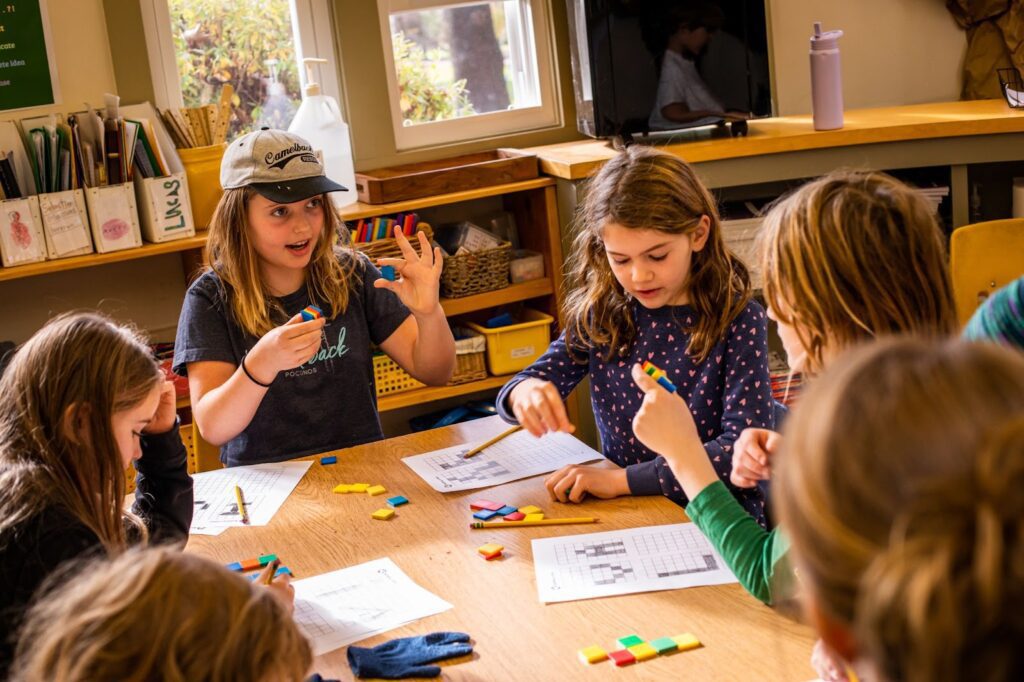
Beyond Play: Building Academic Foundations at SRV
At SRV, academic excellence and social-emotional development are deeply intertwined, creating a comprehensive approach to education.
“Our kids are very strong in their academics,” Mannion emphasizes. “Our math program, Illustrative Mathematics, is particularly wonderful. In preschool, children use materials for play, and then those same materials show up later in the elementary grades as tools for applying mathematical concepts.”
“Our math program follows a constructivist approach, giving students opportunities to make meaning for themselves. We begin by building foundational concepts through concrete representations, such as fraction blocks and manipulatives. From there, we move into real-world scenarios with pictorial representations—like sharing brownies among friends: “You have 10 brownies and 3 friends”—where students can apply their learning in meaningful contexts. Finally, we transition to the abstract, where students solve problems using numerical representations on the page, such as 10 ÷ 3 = ?. We strongly emphasize a growth mindset and regularly engage in class discussions around the idea that there is no single “right way” to do math. Students are exposed to a variety of strategies and problem-solving methods, encouraging them to see how different approaches can lead to the same correct answer. We invite them to try different methods and discover the one that makes the most sense to them. In this way, we are teaching students to be advocates for their own learning while honoring their individual styles and thinking processes. By the end of our program, our students are not just great mathematicians, they are great problem-solvers and critical thinkers who can communicate their thinking clearly” – Kristina Gomez, Math Specialist
Assessment happens continuously but looks different from traditional methods. Instead of worksheets coming home, teachers use authentic, real-world situations to evaluate children’s development.
“In one preschool classroom, teachers created a signup sheet for cleanup jobs. Through this simple activity, they could assess which kids could read words like ‘art’ or ‘kitchen,’ which could write their names independently, which needed help, and even social patterns like which children always cleaned up together.”
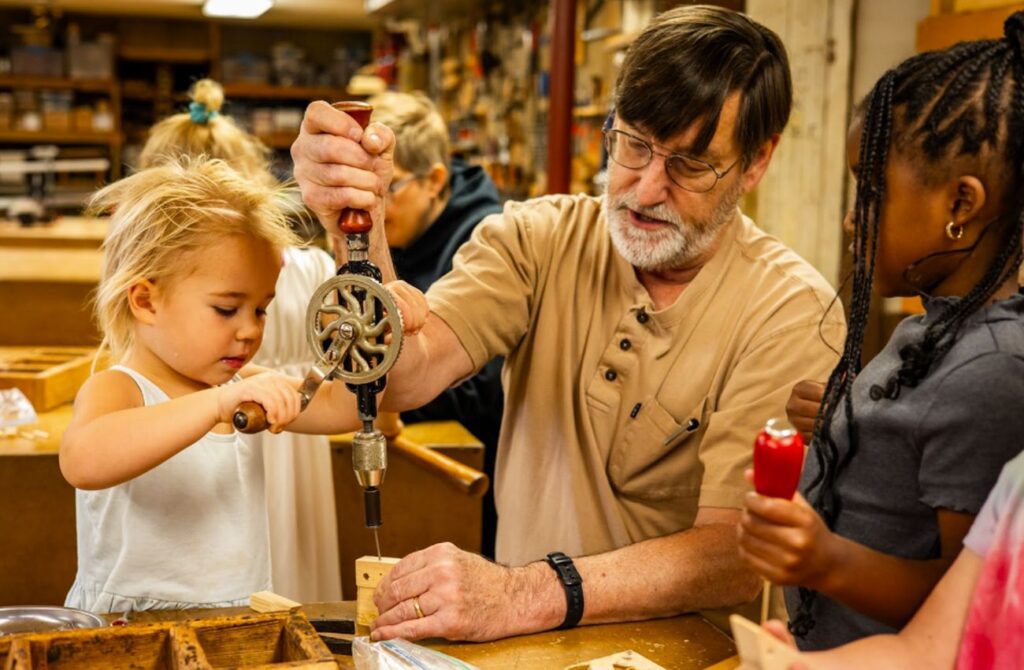
A Day in the Life of an SRV Preschooler
A typical day at SRV’s preschool balances structure with flexibility. Children start with free-choice play in their classrooms, followed by a morning meeting to go over the day’s schedule. Throughout the week, they experience “specials” including art, music, science, Spanish, woodshop, and theater.
One particularly notable aspect of SRV’s program is their woodshop, where even the youngest students use real tools under expert guidance.
“Our woodshop teacher, Mike, has been teaching at SRV for over 40 years and has never given more than a band-aid,” Mannion notes proudly. “When we give kids responsibility, they take responsibility. They’re very capable when we find ways to say yes to their ideas.”
In the woodshop, children gain more than just building skills—they develop patience, delayed gratification, and confidence. The only rules: creations must fit through the door, can’t be weapons, and students must finish what they start.
After morning activities, children enjoy family-style lunch through SRV’s farm-to-fork food program (included in tuition). Lunch even includes eggs from the school’s own hens. Lunch is followed by a quiet rest period. The afternoon brings more opportunities for discovery and play until the full day ends at 3:00 pm, with extended programming available until 6:00 pm.
“We enrolled at SRV thinking it would be a wonderful preschool for our oldest. Preschool turned into kindergarten, and now he is moving through the elementary grades with a brother coming up behind him. We couldn’t bring ourselves to take him away from an environment that offers what every school should: a safe place where kids are encouraged to explore their many interests and budding skills, where the adults seek to understand and challenge appropriately, with lots of fresh air all around.” – Current SRV Parent
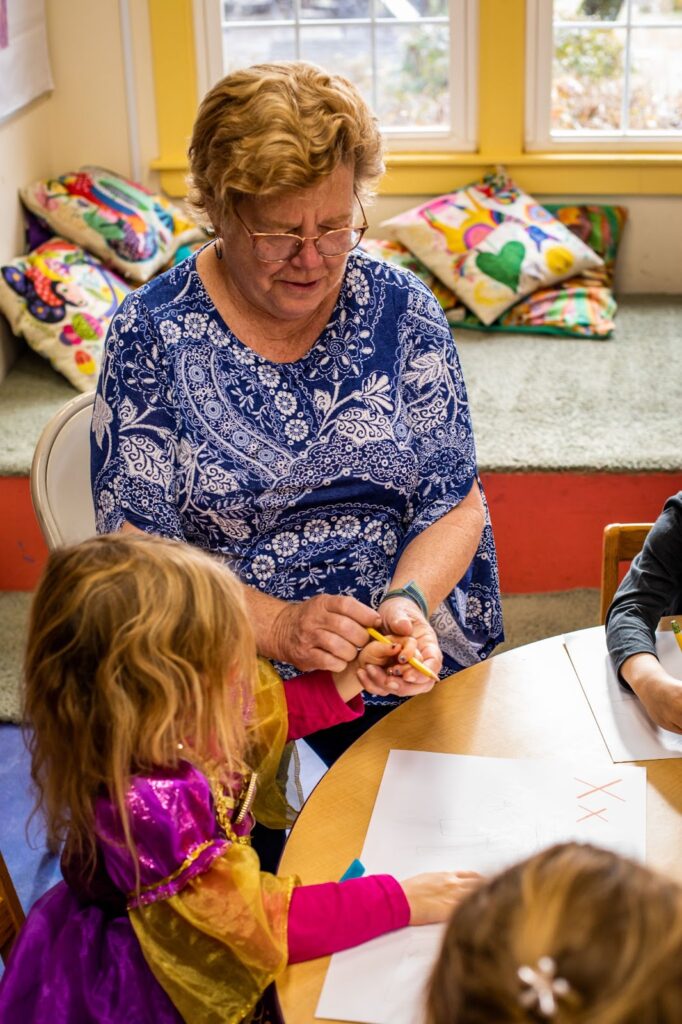
SRV’s Nurturing Social-Emotional Growth
Perhaps the most valuable aspect of SRV’s approach is its intentional focus on social-emotional development.
“In preschool, the bulk of the learning is about how to get my own wants and needs met when I’ve got a whole group of other people with their own wants and needs that may be different from mine,” explains Mannion.
Teachers use intentional language, labeling emotions and actions while scaffolding conflict resolution skills. Their goal by year’s end is to become “a guide on the side” as children learn to advocate for themselves.
One teacher recently described March as “magical” because she could finally see the fruits of her labor—her students had become largely self-sufficient in managing their interactions.
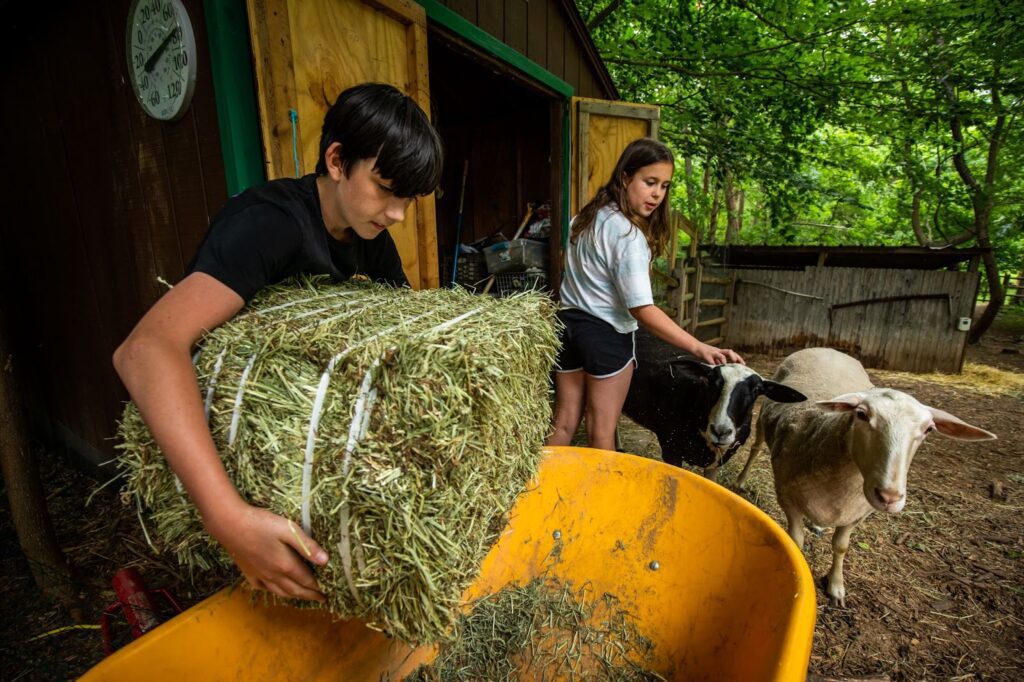
The Parent Partnership at SRV
SRV recognizes that education doesn’t stop at the classroom door. Parents receive weekly updates from teachers that include not just activities but also “pedagogical highlights” explaining the reasoning behind certain approaches.
The school fosters community through class parents, affinity groups, and “putter days” where families come together to maintain the campus, earning back part of their maintenance deposit while demonstrating care for their shared environment.
“What parents often tell us is that our partnership between home and school helps them become better parents,” notes Mannion. “Our teachers are experts in child development, and parents often turn to them for guidance on everything from bedtime challenges to emotional regulation.”
“My daughter and I were both nervous, but the transition to SRV from public school was incredibly smooth. As a result of the personalized and thoughtful outreach before the school year even started, my daughter felt welcomed and connected from day one. Most importantly, she felt seen and valued. She is now going into her 6th grade year at SRV and has the confidence to know that she can adapt to a range of curriculums and pedagogical approaches.” – Kelly Wilcox
The Long-Term Impact on SRV Students
SRV teachers play a vital role, not as lecturers, but as observers, facilitators, and trusted guides. They design experiences based on students’ interests, ask thoughtful questions to spark deeper thinking, and provide just the right balance of structure and freedom. They know when to step in, and just as importantly, when to step back, trusting children to explore, experiment, and make meaning in their own way. “The foundation built in our preschool sets the tone for a lifetime of learning and discovery,” Mannion shares.
“Our students see adults as partners rather than authoritarians—resources to help them rather than scary authority figures,” Mannion observes. “Students know themselves as learners and as people, and they’re not afraid to advocate for themselves.”
This self-awareness and confidence follow SRV students wherever they go, setting them apart as engaged, curious learners who understand their own needs and strengths.
Is The School in Rose Valley Right for Your Family?
For parents seeking an educational environment that honors children’s natural curiosity while building strong academic foundations, the School in Rose Valley offers a compelling alternative to traditional approaches. Their time-tested progressive philosophy, coupled with a stunning natural campus and dedicated expert teachers, creates a truly unique opportunity for young learners to thrive.
To learn more about enrollment opportunities for children ages 2.7 and up, visit theschoolinrosevalley.org or schedule a campus tour to experience this special community firsthand.
Photos courtesy of the School in Rose Valley, as seen in the Main Line Parent Education Guide.
This story supports the Main Line Parent Community. Collaborate with us.



